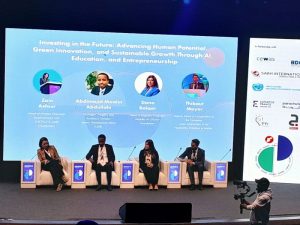


Head of Women Economic Empowerment Unit-SHETECHS, Ms. Zain Asfour moderated the opening session of IGNITE Amman conference organized by SPARK, and powered by the European Union, Google.org, the Islamic Development Bank, and the Abdul Aziz Al Ghurair Refugee
Education Fund, and took place at the King Hussein Business Park Auditorium.
The opening session titled “Investing in the Future”, was moderated by int@j’s Head of Women Economic Empowerment Unit-SHETECHS, Ms. Zain Asfour with the participation of representatives from:
EU
Abdul Aziz Al Ghurair Refugee Education Fund
Islamic Development Bank
Ministry of Investment
With the theme “Investing in the Future,” IGNITE explores the crucial question of how individuals in fragile and conflict-affected regions can remain connected to global economic trends amidst
challenges such as the climate crisis, protracted conflicts worldwide, and the digital revolution.
Attendees will participate in keynotes, panels, and workshops that address green jobs, digital
skills for future job markets, agribusiness, sustainable tourism practices, and the exploration of
AI-driven solutions and resilient strategies that promote inclusive growth and effective policy
development.
The IGNITE conference is the only event worldwide that focuses on job creation in fragile and
conflict-affected regions. The central theme of this year’s conference is: “Investing in the Future,”
IGNITE delves into the pressing question of how communities in fragile regions can remain part of
the global economy despite barriers like the climate crisis, digital shifts, and global instability. By
exploring themes like green economies, digital education, remote work, and agribusiness, IGNITE
provides a platform to strategise around resilience, adaptability, and inclusive growth, especially for
those affected by conflict and displacement. At IGNITE, we bring together over 400 experts from
the private sector, public sector and NGOs to discuss how vulnerable people – youth, refugees,
women – can stay included in the global economy, create jobs, and bring stability, particularly in
Jordan and the Middle East.